SpringWell Whole House Water Filter
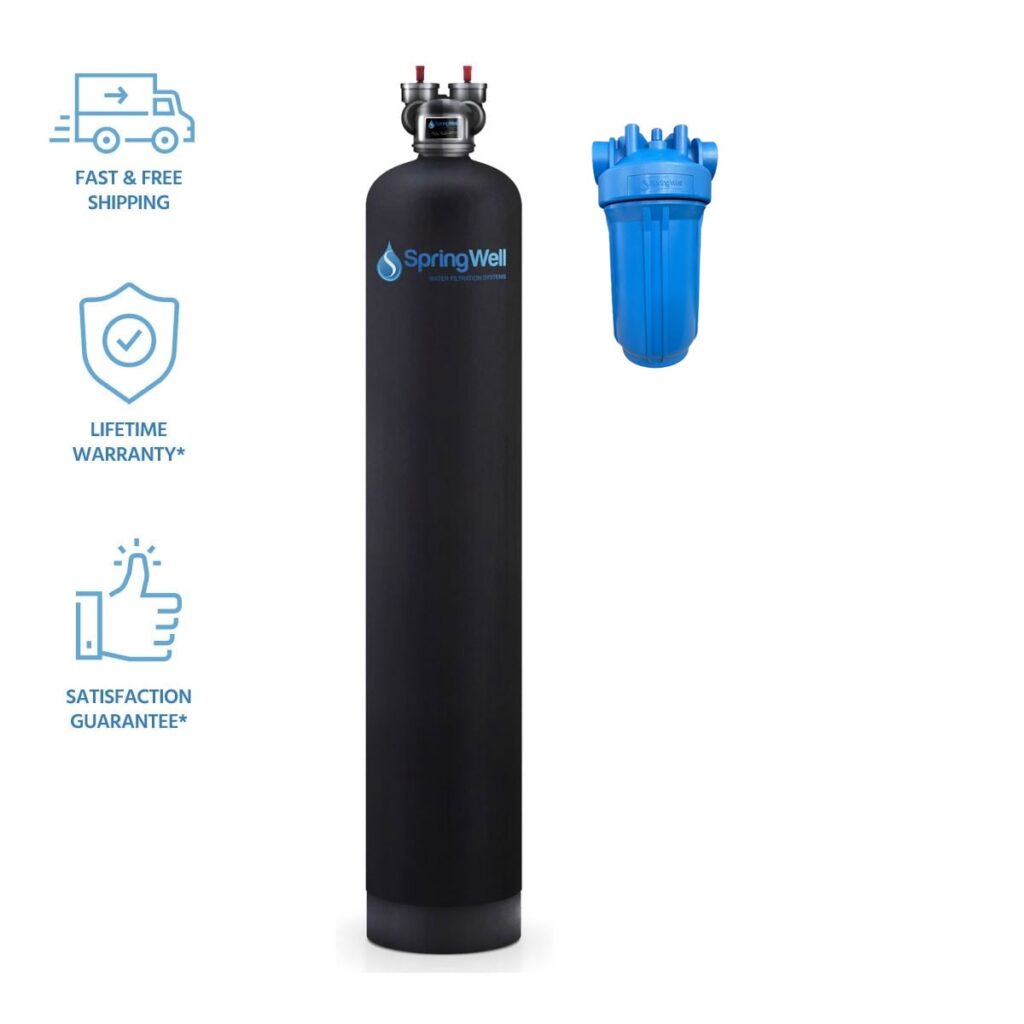
- Contaminants removed: 10+
- Certifications or Testing: –
- Filter Lifespan: 1,000,000 gallons
- Annual Cost: ~$100
- Warranty: Lifetime
Clearly Filtered Water Pitcher
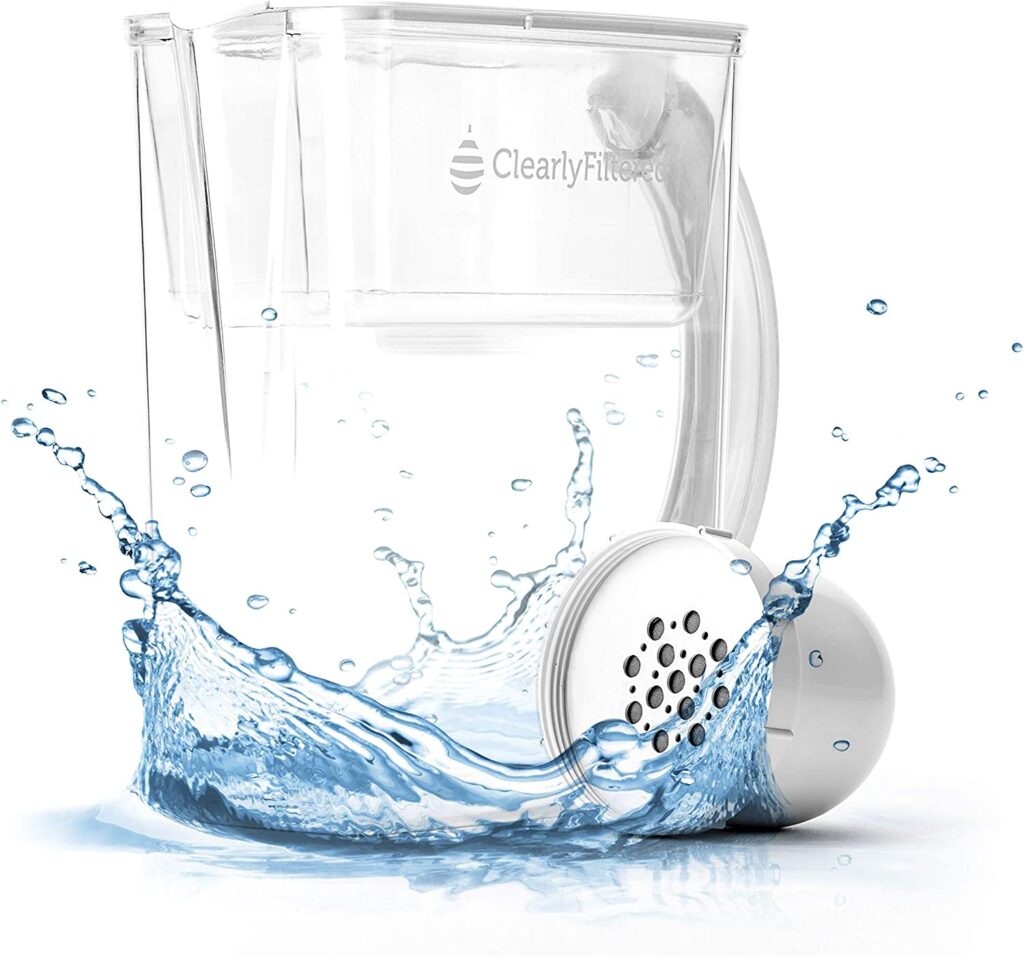
- Contaminants reduced: 365+
- Reviews: 192
- Filter Lifespan: 100 gallons
- Annual Cost: ~$150
- Warranty: Lifetime
Evo E-1000 Whole House Water Filter
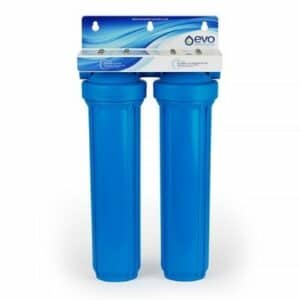
- Contaminants removed: 10+
- Certifications or Testing: –
- Filter Lifespan: 80,000 gallons
- Cost: ~$120 – $300
- Warranty: Lifetime
Chlorine is a common disinfectant used by water treatment facilities to ensure that tap water is free from harmful microorganisms. However, excessive chlorine exposure through drinking or showering can cause skin irritation, hair damage, and other health problems.
Therefore, it is essential to remove chlorine from tap water before consumption. There are various water filters available in the market that claim to remove chlorine effectively. In this article, we will discuss some of the best water filters to remove chlorine and compare their features.
Table of Contents
Best Water Filters for Chlorine
- Best Whole House Filter – SpringWell Water Whole House Water Filter System
- Best under Filter system– 3-Stage Under Sink System
- Best Cartridge Based POE – Evo E-1000 Whole House Water Filter
- Best Reverse Osmosis – AquaTru – Countertop Water Filtration Purification System
- Best Countertop Filter – Big Berkey Gravity-Fed Water Filter
- Best Under-Sink Filter – Epic Smart Shield
- Best Faucet Filter – PUR Plus Faucet Filtration System
- Best Shower Filter – AquaBliss High Output Revitalizing Shower Filter
- 5-Stage Certified Ultra Safe Reverse Osmosis: APEC Water Systems ROES-50
Comparison Table:
| Product Name | Type | Filtration Process | Capacity | Maintenance | Price |
| Spring Well Water Filter Softener Dual Systems | Whole House | Catalytic Carbon Media | 1,000,000 Gallons | Low | $4465.85 |
| Evo Water Systems Whole House Water Filter | Whole House | Activated Carbon Media | 500,000 Gallons | Low | $1,196 |
| Big Berkey Water Filter | Countertop | Black Berkey Filters | 6,000 Gallons | Medium | $278 |
| AquaTru – Countertop Water Filtration Purification System | Countertop | Reverse Osmosis | 600 Gallons | High | $429 |
| APEC Water Systems ROES-50 Essence Series | Under Sink | Reverse Osmosis | 50 Gallons Per Day | Medium | $199 |
| EPIC SMART SHIELD | Pitcher | Affinity Filtration Technology | 80 Gallons | Low | $64.99 |
| Water Pitcher with Affinity Filtration Technology | Pitcher | Affinity Filtration Technology | 40 Gallons | Low | $39.99 |
| AquaBliss High Output Revitalizing Shower Filter | Showerhead | Calcium Sulfite & Redox Media | 10,000 Gallons | Low | $34.86 |
| 3-Stage Under the Sink Water Filter System | Under Sink | Carbon Block & Sediment Filter | 50 Gallons Per Day | Low | $129 |
Spring Well Water Filter Softener Dual Systems – The Best Overall
The Spring Well Water Filter Softener Dual Systems is a powerful filter that can remove up to 99.6% of chlorine and other harmful chemicals from tap water. The system uses a multi-stage filtration process, which includes a sediment filter, a KDF-55 filter, and a catalytic carbon filter.
The sediment filter removes large particles like sand, rust, and dirt, while the KDF-55 filter removes chlorine, heavy metals, and microorganisms. The catalytic carbon filter removes volatile organic compounds (VOCs) and chloramines.
The Spring Well Water Filter Softener Dual Systems is a whole-house filter that can provide clean and healthy water for the entire household. The system can treat up to 1,000,000 gallons of water, which makes it suitable for a large family or a small business. The maintenance of the system is low, and the installation process is easy, although it may require professional help.
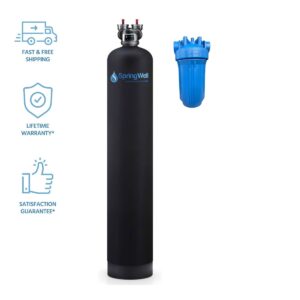
Pros And Cons
Pros
- Combining KDF with carbon gives this filter a superior chlorine removal performance.
- We appreciate the lack of effort needed to look after this system. The 5-micron sediment filter needs replacing every 6-9 months (which is pretty standard for this type of filter) and the carbon/KDF media has a 1,000,000 gallon capacity, so it should last years before a new media is needed.
- SpringWell knows the value of a good warranty. lifetime warranty and a 6-month money-back guarantee,
Cons
- SpringWell doesn’t share test results online, so we don’t know exactly how much chlorine the CF is capable of removing.
- installation is not easy
Evo Water Systems Whole House Water Filter – The Best for Large Capacity
The Evo Water Systems Whole House Water Filter is another great option for removing chlorine from tap water. The system uses a five-stage filtration process, which includes a sediment filter, a coconut shell carbon filter, a KDF-55 filter, a catalytic carbon filter, and a sediment backwash filter.
The sediment filter removes large particles like sand, rust, and dirt, while the coconut shell carbon filter removes chlorine, taste, and odor. The KDF-55 filter removes heavy metals, microorganisms, and scale, while the catalytic carbon filter removes VOCs and chloramines. The sediment backwash filter removes any remaining particles before the water is distributed to the household.
The Evo Water Systems Whole House Water Filter can treat up to 500,000 gallons of water. The system is suitable for a large family or a small business, and it can provide clean and healthy water. The maintenance of the system is low, and the installation process is easy, although it may require professional help.

⭐️ Our readers get 5% off at KindWater.com – 👉 Use Code “MHWT5“
Pros And Cons
Pros
- Effective filtration: The Evo Water Systems uses a multi-stage filtration process to remove a wide range of impurities from your tap water.
- Whole-house filtration: The system is designed to filter all the water in your home, providing clean water for drinking, cooking, bathing, and other household uses.
- Low maintenance: The system requires minimal maintenance, with filter replacement typically needed only once every six months to one year.
- Improved water quality: The Evo Water Systems Whole House Water Filter can improve the taste, odor, and appearance of your tap water, making it more pleasant to use and consume.
- Long-lasting filters: The filters can last for up to one year, reducing the need for frequent replacements and saving money in the long run.
Cons
- Initial cost: The Evo Water Systems Whole House Water Filter can be more expensive than other types of water filtration systems, which may make it less accessible to some consumers.
- Installation requirements: The system requires professional installation, which can add to the overall cost of using the system.
Big Berkey Water Filter – The Best Portable Option
The Big Berkey Water Filter is a portable water filter that can remove chlorine, lead, and other contaminants from tap water. The system uses a gravity-fed filtration process, which includes two Black Berkey purification elements. The elements are made of high-quality coconut shell carbon and remove up to 99.9% of contaminants from tap water. The system is suitable for outdoor activities, camping, and emergency situations.
The Big Berkey Water Filter can treat up to 6,000 gallons of water, which makes it suitable for a small family or a group of people. The maintenance of the system is low, and the installation process is easy. The system is also compact and can fit easily in a backpack or a car trunk.
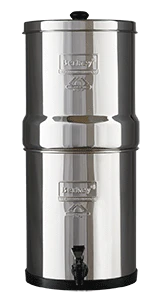
Pros And Cons
Pros
- Effective filtration: The Big Berkey uses a combination of activated carbon and ceramic filters to remove a wide range of impurities from your tap water.
- No electricity required: The system operates by gravity and does not require any electricity, making it a good option for off-grid or emergency situations.
- Large capacity: The Big Berkey can hold up to 2.25 gallons of water, making it suitable for larger households or outdoor activities.
- Portable: The system is designed to be easily transported, and is a popular choice for camping, hiking, and other outdoor activities.
- Long-lasting filters: The filters can last for up to 3,000 gallons, reducing the need for frequent replacements and saving money in the long run.
Cons
- Slow filtration: The gravity-fed filtration process can be slower than other types of filtration systems, which may be a concern for some consumers.
- Maintenance: While the filters last a long time, they will still need to be cleaned and replaced periodically, which can add to the overall cost of using the system.
AquaTru – Countertop Water Filtration Purification System – The Best for Convenience
The AquaTru – Countertop Water Filtration Purification System is a countertop filter that can remove chlorine and other contaminants from tap water. The system uses a four-stage filtration process, which includes a pre-filter, a carbon filter, a RO membrane, and a VOC filter.
The pre-filter removes large particles like sand, rust, and dirt, while the carbon filter removes chlorine, taste, and odor. The RO membrane removes up to 99.9% of contaminants, including lead, fluoride, and microorganisms. The VOC filter removes VOCs and other harmful chemicals.
The AquaTru – Countertop Water Filtration Purification System is a convenient filter that can provide clean and healthy water for every use. The system can treat up to 1 gallon of water at a time, and it has a compact design that can fit easily on any kitchen countertop. The system is also easy to use, and it requires minimal maintenance. The filters can be replaced easily, and the system comes with a digital display that indicates when the filters need to be changed.
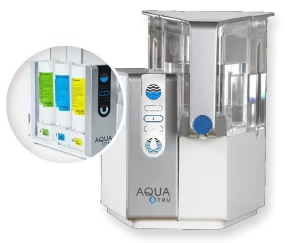
Pros And Cons
Pros
- Effective filtration: The AquaTru uses a four-stage filtration process to remove a wide range of impurities from your tap water, including lead, chlorine, and VOCs.
- Convenience: The system is designed to be used on your countertop and doesn’t require any installation or plumbing, making it a convenient option for households.
- Easy to use: The AquaTru has a user-friendly interface and is easy to operate, with clear instructions for maintenance and filter replacement.
- Compact design: The compact design of the AquaTru allows it to fit easily on most countertops without taking up too much space.
- Long-lasting filters: The filters can last for up to two years, reducing the need for frequent replacements and saving money in the long run.
Cons
- Limited capacity: The AquaTru is designed for household use and has a limited capacity, which may not be sufficient for larger households or commercial use.
- High initial cost: The AquaTru can be more expensive than other types of water filtration systems, which may make it less accessible to some consumers.
- Maintenance: While the filters last a long time, they will still need to be replaced periodically, which can add to the overall cost of using the system.
APEC Water Systems ROES-50 Essence Series – The Best for Reverse Osmosis
The APEC Water Systems ROES-50 Essence Series is a reverse osmosis water filter that can remove chlorine, fluoride, lead, and other contaminants from tap water. The system uses a five-stage filtration process, which includes a sediment filter, a carbon block filter, a RO membrane, and two carbon block post-filters.
The sediment filter removes large particles like sand, rust, and dirt, while the carbon block filter removes chlorine, taste, and odor. The RO membrane removes up to 99.9% of contaminants, including lead, fluoride, and microorganisms. The carbon block post-filters remove any remaining contaminants before the water is distributed.
The APEC Water Systems ROES-50 Essence Series is a powerful filter that can provide clean and healthy water for every use. The system can treat up to 50 gallons of water per day, which makes it suitable for a small family. The maintenance of the system is low, and the installation process is easy, although it may require professional help.
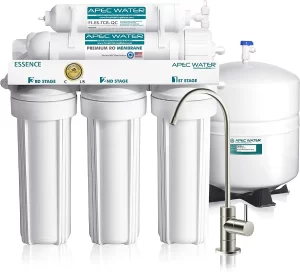
Pros And Cons
Pros
- Effective filtration: The ROES-50 uses a reverse osmosis process to remove impurities from your tap water, including bacteria, viruses, and dissolved solids like lead and arsenic.
- High capacity: The system can produce up to 50 gallons of purified water per day, which is suitable for larger households or commercial use.
- Easy installation: The ROES-50 comes with clear and easy-to-follow instructions for installation and maintenance.
- Long-lasting filters: The filters can last up to 12 months, reducing the need for frequent replacements and saving money in the long run.
- Improved taste and odor: The ROES-50 can remove impurities that affect the taste and odor of your water, providing clean, fresh-tasting drinking water.
Cons
- Initial cost: The ROES-50 can be more expensive than other types of water filtration systems, which may make it less accessible to some consumers.
- Maintenance: While the filters last a long time, they will still need to be replaced periodically, which can add to the overall cost of using the system.
- Wastewater production: Reverse osmosis systems like the ROES-50 produce wastewater as part of the filtration process, which can be a concern in areas with limited water resources.
EPIC SMART SHIELD – The Best for Bottleless Water Cooler
The EPIC SMART SHIELD is a bottleless water cooler that can provide clean and healthy water for every use. The system uses a multi-stage filtration process, which includes a sediment filter, a carbon block filter, a RO membrane, and a post-filter.
The sediment filter removes large particles like sand, rust, and dirt, while the carbon block filter removes chlorine, taste, and odor. The RO membrane removes up to 99.9% of contaminants, including lead, fluoride, and microorganisms. The post-filter removes any remaining contaminants before the water is distributed.
The EPIC SMART SHIELD is a powerful filter that can be used in offices, homes, and other commercial settings. The system can provide hot and cold water, and it has a compact design that can fit easily in any space. The maintenance of the system is low, and the installation process is easy, although it may require professional help.
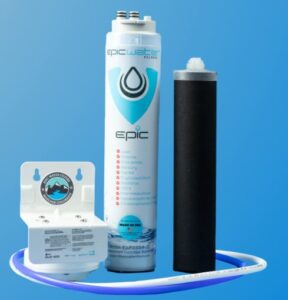
Pros And Cons
Pros
- Advanced filtration: The EPIC Smart Shield uses a combination of activated carbon and ceramic filtration to remove a wide range of contaminants from your tap water, including chlorine, lead, and bacteria.
- Easy installation: The system is designed to be easily installed under your sink, and comes with all necessary hardware and instructions.
- Long-lasting filters: The filters are designed to last for up to 12 months, reducing the need for frequent filter replacements.
- Space-saving design: The compact design of the EPIC Smart Shield allows it to fit easily under most sinks, saving valuable counter space.
- Great taste: The EPIC Smart Shield’s advanced filtration process can remove impurities that affect the taste and odor of your water, providing clean, fresh-tasting drinking water.
Cons
- Initial cost: The EPIC Smart Shield system can be more expensive than other types of water filtration systems, which may make it less accessible to some consumers.
- Maintenance: While the filters last a long time, they will still need to be replaced periodically, which can add to the overall cost of using the system.
Water Pitcher with Affinity Filtration Technology – The Best for Budget
The Water Pitcher with Affinity Filtration Technology is a budget-friendly option that can remove chlorine, lead, and other contaminants from tap water. The system uses a two-stage filtration process, which includes a carbon block filter and an Affinity Filtration Technology filter. The carbon block filter removes chlorine, taste, and odor, while the Affinity Filtration Technology filter removes lead and other heavy metals.
The Water Pitcher with Affinity Filtration Technology is a simple and easy-to-use filter that can provide clean and healthy water for every use. The system can treat up to 40 gallons of water, which makes it suitable for a small family. The maintenance of the system is low, and the replacement filters are affordable.
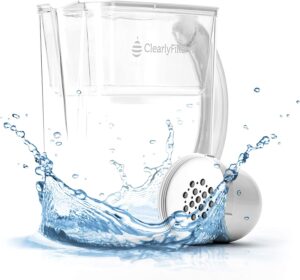
Pros And Cons
Pros
- Effective filtration: Affinity filtration technology can remove a wide range of contaminants, including chlorine, heavy metals, and organic compounds, providing high-quality drinking water.
- Long-lasting filters: Filters with affinity filtration technology can last longer than traditional activated carbon filters, reducing the frequency of filter replacements and saving money in the long run.
- Enhanced taste and odor: Removing impurities from your tap water can improve its taste and odor, making it more enjoyable to drink.
- Convenience: A water pitcher with affinity filtration technology is easy to use and doesn’t require any installation, making it a convenient option for households.
Cons
- Initial cost: A water pitcher with affinity filtration technology can be more expensive than traditional water pitchers with basic filters.
- Limited capacity: Like all water pitchers, a pitcher with affinity filtration technology has a limited capacity and will need to be refilled frequently.
AquaBliss High Output Revitalizing Shower Filter – The Best for Shower Water
The AquaBliss High Output Revitalizing Shower Filter is a filter that can remove chlorine, heavy metals, and other contaminants from shower water. The system uses a multi-stage filtration process, which includes a sediment filter, a KDF-55 filter, and a calcium sulfite filter.
The sediment filter removes large particles like sand, rust, and dirt, while the KDF-55 filter removes chlorine, heavy metals, and microorganisms. The calcium sulfite filter removes chlorine and other contaminants that can cause dry and itchy skin, frizzy hair, and other skin and hair problems.
The AquaBliss High Output Revitalizing Shower Filter is a simple and easy-to-install filter that can provide clean and healthy shower water for every use. The system can be installed in minutes, and it does not require any tools or professional help. The filter can treat up to 12,000 gallons of water, which makes it suitable for a family of four for six months.
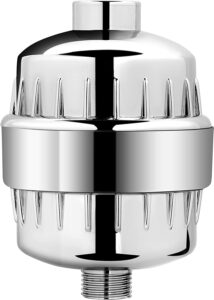
Pros And Cons
Pros
- Removes harmful chemicals: The AquaBliss shower filter removes a variety of harmful chemicals from your shower water, including chlorine, pesticides, and heavy metals, which can be damaging to your skin and hair.
- Softens water: This shower filter also softens water, making it gentler on your skin and hair, and reducing the likelihood of dryness and irritation.
- Easy to install: The AquaBliss shower filter is easy to install, and doesn’t require any special tools or plumbing expertise.
- Long-lasting filter: The filter in the AquaBliss shower filter is designed to last up to six months, depending on usage, which means you won’t have to replace it too frequently.
- Improves water pressure: Many users report that this shower filter improves water pressure, providing a more enjoyable shower experience.
- Affordable: The AquaBliss shower filter is reasonably priced, making it accessible to a wide range of consumers.
Cons
- May not fit all shower heads: The AquaBliss shower filter is designed to fit most shower heads, but it may not work with all models, particularly those with unusual shapes or sizes.
- May require more maintenance: Some users report that this shower filter requires more maintenance than others,
3-Stage Under the Sink Water Filter System – The Best for Convenience
The 3-Stage Under the Sink Water Filter System is a filter that can remove chlorine, lead, and other contaminants from tap water. The system uses a three-stage filtration process, which includes a sediment filter, a carbon block filter, and a post-filter. The sediment filter removes large particles like sand, rust, and dirt, while the carbon block filter removes chlorine, taste, and odor. The post-filter removes any remaining contaminants before the water is distributed.
The 3-Stage Under the Sink Water Filter System is a convenient and easy-to-install filter that can provide clean and healthy water for every use. The system can be installed under the sink, which saves countertop space and reduces clutter. The filter can treat up to 10,000 gallons of water, which makes it suitable for a small family for six months. The replacement filters are affordable, and the maintenance of the system is low.
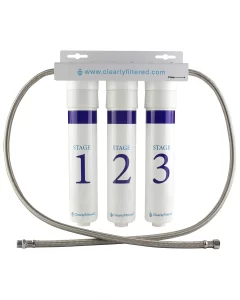
Pros And Cons
Pros
- Effective filtration: The ClearlyFiltered 3-Stage Under-the-Sink Water Filter System uses a three-stage filtration process that removes a wide range of contaminants from your water, including chlorine, lead, pesticides, and pharmaceuticals.
- High capacity: This water filter system has a high capacity, which means it can filter up to 10,000 gallons of water before requiring a filter replacement.
- Easy to install: The ClearlyFiltered 3-Stage Under-the-Sink Water Filter System is easy to install, and comes with all the necessary hardware and instructions.
- Saves money: By filtering your own water at home, you can save money on bottled water and reduce your environmental footprint.
- Improves taste and odor: This water filter system can improve the taste and odor of your water, making it more enjoyable to drink and cook with.
- Compact design: The ClearlyFiltered 3-Stage Under-the-Sink Water Filter System has a compact design that doesn’t take up much space under your sink.
Cons
- Requires installation: Unlike countertop or pitcher water filters, the ClearlyFiltered 3-Stage Under-the-Sink Water Filter System requires installation, which may be difficult for some users.
- Initial investment: This water filter system requires an initial investment, which may be higher than other types of water filters.
Understanding the Harmful Effects of Chlorine in Drinking Water
Chlorine is a widely used disinfectant that is added to public water supplies to kill bacteria and other microorganisms that can cause waterborne diseases. While chlorine is effective in killing harmful pathogens, it can also have negative effects on human health if consumed in high amounts over a prolonged period.
Another potential problem associated with chlorine in drinking water is its impact on the taste and odor of water. Chlorine can give water a chemical taste and smell, which can be unappealing to some people. Additionally, chlorine can cause dry skin and hair, as well as aggravate existing skin conditions such as eczema and psoriasis.
Pregnant women, young children, and people with weakened immune systems are especially vulnerable to the harmful effects of chlorine in drinking water. The long-term health effects of consuming chlorinated water are not yet fully understood, but it is widely accepted that reducing exposure to chlorine and its byproducts can help prevent potential health problems.
By understanding the harmful effects of chlorine in drinking water, we can take steps to reduce our exposure to this chemical and protect our health. Installing a water filter that can remove chlorine and its byproducts is an effective way to ensure that the water we drink and use for cooking and cleaning is safe and healthy.
Chlorine Water Filter Buyer’s Guide
Keen to learn more about chlorine filtration before you spend your money? You’ll find the answers to all your questions in this buyer’s guide.
What is Chlorine?
Chlorine is a chemical element with the symbol Cl and atomic number 17. It is a highly reactive and corrosive gas that is used in a variety of applications, including as a disinfectant in water treatment, a bleach in the production of paper and textiles, and a component in the production of various chemicals.
Why is Chlorine Added to Drinking Water?
Chlorine is added to drinking water for the purpose of disinfection. It is an effective and low-cost way to kill or neutralize harmful bacteria, viruses, and other microorganisms that may be present in the water supply, and is used in most municipal water treatment facilities around the world.
By adding chlorine to drinking water, water treatment facilities can help prevent the spread of waterborne diseases like cholera, typhoid fever, and dysentery. Chlorine works by oxidizing and destroying the cellular structures of these harmful microorganisms, rendering them inactive and unable to cause illness.
Is Chlorine in Tap Water Safe or Dangerous?
Chlorine in tap water is generally considered safe in the concentrations typically used for water treatment. The Environmental Protection Agency (EPA) has established regulations for the amount of chlorine that can be used in drinking water, and these levels are designed to ensure that the water is safe for consumption.
While some people may be concerned about the taste or odor of chlorine in their tap water, these levels are not typically high enough to pose a significant health risk. In fact, the benefits of using chlorine to disinfect drinking water far outweigh the potential risks associated with its use.
However, it is important to note that excessive exposure to chlorine can be harmful, and some individuals may be more sensitive to its effects than others. For example, exposure to high levels of chlorine gas can cause respiratory irritation, and some people may experience skin or eye irritation from chlorine in their tap water.
If you are concerned about the chlorine levels in your tap water, you may wish to consider using a water filter to remove chlorine and other impurities. There are many different types of water filters available, and selecting the right one will depend on your specific needs and concerns.
Chlorine Effects on Skin and Hair
Chlorine can have some negative effects on the skin and hair, particularly with prolonged or frequent exposure. Here are some of the most common effects of chlorine on skin and hair:
Skin:
- Dryness: Chlorine can strip the skin of its natural oils, leading to dryness and flakiness.
- Irritation: Some people may experience redness, itching, or rashes on the skin after exposure to chlorine.
- Sensitivity: Prolonged exposure to chlorine can make the skin more sensitive to other irritants, such as soaps, lotions, and fragrances.
- Discoloration: Chlorine can cause some fabrics, such as swimsuits, to fade or change color when exposed to pool water.
Hair:
- Dryness: Chlorine can strip the natural oils from the scalp and hair, leading to dryness and brittleness.
- Discoloration: Prolonged exposure to chlorine can cause hair to become discolored or develop a greenish tint.
- Damage: Chlorine can weaken the hair shaft and make it more prone to breakage, leading to split ends and frizziness.
To reduce the negative effects of chlorine on skin and hair, it is recommended to rinse off thoroughly after exposure to chlorinated water. Using a moisturizing lotion or oil on the skin and a leave-in conditioner on the hair can also help mitigate the drying effects of chlorine. Additionally, wearing a swim cap or applying a protective hair serum before swimming can help minimize chlorine exposure to the hair.
Benefits of Using a Water Filter to Remove Chlorine
Using a water filter to remove chlorine from drinking water can have many benefits for our health and overall well-being. Here are some of the top benefits of using a water filter to remove chlorine:
Reducing the risk of cancer:
As mentioned earlier, chlorine can react with organic matter in water to form disinfection byproducts (DBPs) such as trihalomethanes (THMs), which have been linked to an increased risk of cancer. Using a water filter that removes chlorine can significantly reduce exposure to these harmful byproducts, thereby reducing the risk of cancer.
Improving taste and odor of water:
Chlorine has a distinct chemical taste and smell that many people find unappealing. A water filter that removes chlorine can improve the taste and odor of water, making it more enjoyable to drink.
Reducing dry skin and hair:
Chlorine can cause dry skin and hair by stripping the natural oils from our skin and hair. Using a water filter that removes chlorine can help alleviate these problems and leave skin and hair feeling softer and healthier.
Protecting the environment:
Chlorine and its byproducts can be harmful to the environment, particularly aquatic life. Using a water filter that removes chlorine can help reduce the amount of chlorine and DBPs that are released into the environment.
Saving money:
Buying bottled water can be expensive and create a lot of plastic waste. Using a water filter to remove chlorine can provide a more cost-effective and environmentally friendly alternative to buying bottled water.
Overall, using a water filter to remove chlorine can have many benefits for our health, the environment, and our wallets. By removing chlorine and its harmful byproducts from our drinking water, we can ensure that we are consuming clean, healthy water that is free of harmful contaminants.
How does a Chlorine Filter Work?
A chlorine filter works by removing chlorine and other chemicals from water as it passes through the filter. There are several types of filters that can be used to remove chlorine, including activated carbon filters, reverse osmosis filters, and catalytic carbon filters.
Types of Water Treatment Systems That Remove Chlorine
There are several types of water filters available in the market that can effectively remove chlorine from drinking water. Here are some of the most common types of water filters that can remove chlorine:
Carbon Filters:
Carbon filters are the most common type of water filter used to remove chlorine. These filters use activated carbon to remove chlorine and other impurities from water by adsorption. The carbon filter traps the chlorine molecules and other impurities as they pass through the filter, leaving the water clean and free of contaminants. Carbon filters are available in different forms such as pitchers, faucet-mounted filters, countertop filters, and whole house systems.
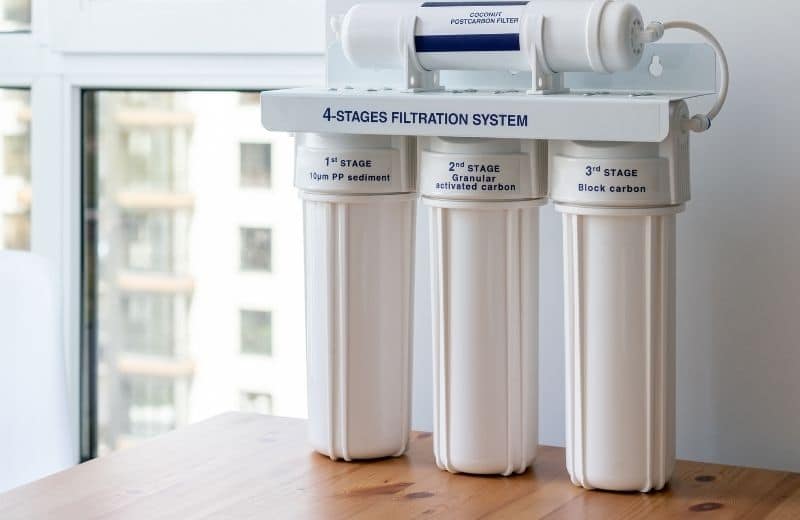
Reverse Osmosis Filters:
Reverse osmosis (RO) filters use a semipermeable membrane to remove chlorine, dissolved solids, and other impurities from water. The membrane traps the impurities while allowing clean water to pass through. RO filters are effective in removing chlorine, but they can also remove beneficial minerals from water, which may need to be added back through remineralization.
Ultraviolet Filters:
Ultraviolet (UV) filters use UV light to kill bacteria, viruses, and other microorganisms in water. They can also remove chlorine and other chemicals from water, but they do not physically remove any impurities. UV filters are often used in combination with other types of filters to provide complete water treatment.
Ceramic Filters:
Ceramic filters are made of porous ceramic material that can remove chlorine, bacteria, and other impurities from water. These filters work by trapping impurities in the tiny pores of the ceramic material. Ceramic filters are often used in combination with other types of filters for better filtration performance.
Ion Exchange Filters:
Ion exchange filters use a resin to remove chlorine and other impurities from water. The resin traps the impurities and exchanges them with beneficial minerals such as calcium and magnesium. Ion exchange filters are often used in combination with other types of filters for better filtration performance.
Each type of water filter has its own advantages and disadvantages, and choosing the right type of filter depends on your specific needs and preferences. It is essential to research and compare different types of filters to determine which one is the best fit for your home and family.
Factors to Consider When Choosing a Water Filter to Remove Chlorine
When choosing a water filter to remove chlorine, there are several factors to consider to ensure that you select the right filter for your home and family. Here are some of the most important factors to consider when choosing a water filter to remove chlorine:
Filtration Efficiency:
The filtration efficiency of a water filter is an essential factor to consider. You should look for a filter that can effectively remove chlorine and its byproducts, as well as other contaminants that may be present in your water. The filter’s efficiency can be determined by its NSF/ANSI certification, which indicates that the filter has been tested and verified to meet certain standards for water quality.
Type of Filter:
There are different types of water filters available, as discussed earlier. The type of filter you choose will depend on your specific needs and preferences. For example, if you want to remove chlorine from your entire house, you may need a whole-house system, while a countertop or under-sink filter may be suitable for removing chlorine from drinking water only.
Cost:
The cost of a water filter is an important consideration. Some types of filters, such as whole-house systems or reverse osmosis filters, can be more expensive than others. However, it is important to remember that the cost of a filter does not always correlate with its quality or effectiveness.
Maintenance:
The maintenance requirements of a water filter should also be considered. Some filters require regular replacement of filter cartridges or membranes, while others may require periodic cleaning or disinfection. It is important to choose a filter that is easy to maintain and fits within your budget.
Water Pressure:
The water pressure in your home is another important factor to consider when choosing a water filter. Some filters may require a minimum water pressure to function effectively, while others may require a booster pump to increase water pressure.
Capacity:
The capacity of a water filter refers to how much water it can filter before needing to be replaced or maintained. It is important to choose a filter with a capacity that meets your daily water needs to avoid frequent replacements or maintenance.
By considering these factors, you can select a water filter that meets your specific needs and provides clean, healthy water free of chlorine and its harmful byproducts.
How to Install and Maintain Your Water Filter for Optimal Performance
Installing and maintaining your water filter is crucial for ensuring optimal performance and longevity of the filter. Here are some tips on how to install and maintain your water filter:
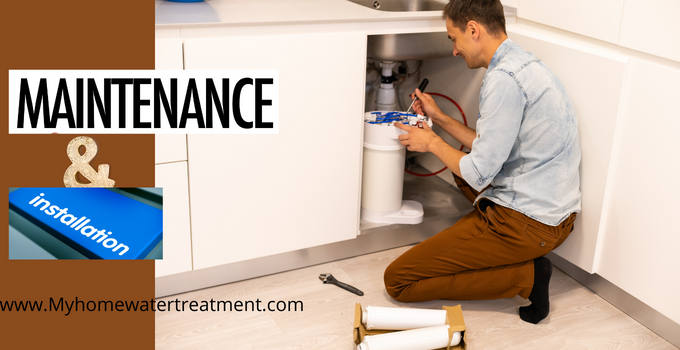
Read the Instructions:
Before installing your water filter, make sure to read the instructions carefully. Different filters may have different installation instructions, so it’s important to follow the instructions specific to your filter.
Choose the Right Location:
When installing your filter, choose a location that is easily accessible and where it can be securely mounted. Make sure to avoid placing the filter near sources of heat, such as a water heater or stove, as this can affect its performance.
Replace Filters Regularly:
Depending on the type of filter you have, you will need to replace the filter cartridge or membrane regularly. Check the manufacturer’s instructions to determine the recommended replacement schedule. Regularly replacing the filter will ensure that it continues to effectively remove chlorine and other contaminants from your water.
Monitor Water Pressure:
If you notice a decrease in water pressure after installing your filter, it may be clogged with sediment or other debris. In this case, you may need to clean or replace the filter. Regularly monitoring water pressure can help you identify when it’s time to clean or replace the filter.
Clean and Maintain the Filter:
Depending on the type of filter you have, you may need to periodically clean or maintain it. For example, if you have a reverse osmosis filter, you may need to periodically clean the membrane. Check the manufacturer’s instructions for specific maintenance requirements.
Use High-Quality Replacement Parts:
When replacing filters or other parts, make sure to use high-quality replacement parts from the manufacturer. Using low-quality parts can affect the performance of your filter and may even damage the filter.
By following these tips, you can ensure that your water filter is installed and maintained properly for optimal performance and longevity. Regularly monitoring and maintaining your filter will help ensure that you have clean, healthy water free of chlorine and other harmful contaminants.
FAQs About Water Filters to Remove Chlorine
How does a water filter remove chlorine?
A water filter removes chlorine through a process called adsorption, where the chlorine molecules are attracted to and trapped by the filter media. Most water filters use activated carbon, which has a large surface area and a porous structure that allows it to effectively trap chlorine and other contaminants.
Do all water filters remove chlorine?
No, not all water filters are designed to remove chlorine. Some filters, such as sediment filters or softeners, are designed to remove physical particles or minerals from water and may not be effective at removing chlorine. It’s important to choose a water filter specifically designed to remove chlorine if this is a concern for you.
Can a water filter remove all contaminants from water?
No, while water filters are effective at removing many contaminants, they may not remove all contaminants. It’s important to choose a water filter that is specifically designed to remove the contaminants of concern in your water. If you’re not sure what contaminants are in your water, consider having your water tested by a certified laboratory.
How often do I need to replace my water filter?
The frequency of filter replacement will depend on the type of filter you have and the volume of water you use. Most manufacturers will provide recommendations for when to replace the filter cartridge or membrane, which can range from every 3-6 months to every 2-3 years. It’s important to follow the manufacturer’s recommendations to ensure the filter continues to effectively remove chlorine and other contaminants.
Can I install a water filter myself?
Yes, many water filters can be easily installed by homeowners with basic plumbing skills. However, if you’re not comfortable installing the filter yourself, it’s always best to hire a professional plumber to ensure the filter is installed correctly.
Are water filters expensive to maintain?
The cost of maintaining a water filter will depend on the type of filter you have and the frequency of filter replacement. While some filters may require more frequent replacement or more expensive replacement cartridges, many water filters are relatively low maintenance and cost-effective in the long run. It’s important to consider the cost of replacement parts when choosing a water filter.
Comparing the Cost of Different Water Filters to Remove Chlorine
When comparing the cost of different water filters to remove chlorine, it’s important to consider both the initial cost of the filter and the ongoing cost of replacement filters or cartridges.
Some water filters, such as the AquaBliss High Output Revitalizing Shower Filter or the Water Pitcher with Affinity Filtration Technology, have a relatively low initial cost and do not require replacement filters, making them a more cost-effective option in the long run. However, these filters may not be as effective at removing chlorine as more advanced systems.
Other water filters, such as the Spring Well Water Filter Softener Dual Systems or the APEC Water Systems ROES-50 Essence Series, have a higher initial cost but provide advanced filtration and may require less frequent filter replacement, making them a good long-term investment. These systems are also designed to remove a wider range of contaminants in addition to chlorine, providing more comprehensive water treatment.
When considering the cost of replacement filters, it’s important to check the manufacturer’s recommendations for filter replacement frequency and cost. Some filters, such as those using reverse osmosis membranes, may have a higher cost for replacement cartridges but require less frequent replacement. Other filters, such as those using activated carbon, may require more frequent replacement but have a lower cost per replacement cartridge.
Ultimately, the cost of a water filter to remove chlorine will depend on the specific needs and budget of the homeowner. It’s important to consider both the initial cost and ongoing maintenance costs when choosing a water filter, and to choose a system that provides effective chlorine removal while also addressing other potential contaminants in your water.
Conclusion: Choosing the Best Water Filter to Remove Chlorine
Choosing the best water filter to remove the chlorine will depend on a variety of factors, including the level of chlorine in your water, your budget, and the specific needs of your household. When selecting a water filter, it’s important to consider the effectiveness of the filter at removing chlorine, as well as its ability to remove other potential contaminants.
Some of the top options for water filters to remove chlorine include the Spring Well Water Filter Softener Dual Systems, the Evo Water Systems Whole House Water Filter, and the AquaTru Countertop Water Filtration Purification System. These systems use advanced filtration methods, such as activated carbon or reverse osmosis, to effectively remove chlorine and a wide range of other contaminants from your water.